APPEAL FOR ASSISTANCE WITH THE MISSION OF OUR DIOCESE

Behold now, what is so good or so joyous as for brethren to dwell together in unity? It is like the oil of myrrh upon the head, which runneth down upon the beard, upon the beard of Aaron, which runneth down to the fringe of his raiment (Psalm 132:1-2).
“Faith is to live humbly and to give alms.” – Abba Poemen
Christ is risen!
Three years ago, I was wondering how, with our limited resources, we could make the truth known, share what we believe, and additionally provide better spiritual support for those in our diocese without regular access to church services or a local community of True Orthodox Christians. I commissioned a report on developing a mission to achieve this.
What we learned from our report was that even with our limited resources we could do all of the above while simultaneously raising the spiritual level of all of the members of our diocese. Based on the findings and recommendations of our report I decided to centre our mission on a new Telegram discussion group with 1) weekly spiritual reading and discussion sessions, 2) the production of spiritual and missionary videos and podcasts, and 3) the running of pilgrimages and conferences. For the last two years we have been running this mission, and I am pleased with the spiritual benefits it brings, as well as the friendships which have blossomed between the members and friends of our diocese through all of our activities together.
Today I will list the main influences of our mission in the hope that you will recognise in it a continuation of the missions of the Tsarist Russian Orthodox Church, and subsequently the ROCOR from whom we draw our apostolic succession. The first major inspiration for our mission was the following teaching from the Longer Catechism of Metropolitan Philaret of Moscow:
16. How is divine revelation spread among men and preserved in the true Church?
By two channels–holy tradition and holy Scripture.
17. What is meant by the name holy tradition?
By the name holy tradition is meant the doctrine of the faith, the law of God, the sacraments, and the ritual as handed down by the true believers and worshipers of God by word and example from one to another, and from generation to generation.
18. Is there any sure repository of holy tradition?
All true believers united by the holy tradition of the faith, collectively and successively, by the will of God, compose the Church; and she is the sure repository of holy tradition, or, as St. Paul expresses it, The Church of the living God, the pillar and ground of the truth. 1 Tim. iii. 15.
St. Irenæus writes thus:
We ought not to seek among others the truth, which we may have for asking from the Church; for in her, as in a rich treasure-house, the Apostles have laid up in its fullness all that pertains to the truth, so that whosoever seeketh may receive from her the food of life. She is the door of life. (Adv. Hæres. lib. iii. c. 4.)
21. Which is the more ancient, holy tradition or holy Scripture?
The most ancient and original instrument for spreading divine revelation is holy tradition. From Adam to Moses there were no sacred books. Our Lord Jesus Christ Himself delivered His divine doctrine and ordinances to his Disciples by word and example, but not by writing. The same method was followed by the Apostles also at first, when they spread abroad the faith and established the Church of Christ. The necessity of tradition is further evident from this, that books can be available only to a small part of mankind, but tradition to all.
24. Why is tradition necessary even now?
As a guide to the right understanding of holy Scripture, for the right ministration of the sacraments, and the preservation of sacred rites and ceremonies in the purity of their original institution.
It is essential for learners in the Faith to learn from the experienced, and it is clear that this instruction can only come from within the Church. We need to first possess a certain amount of humility to understand spiritual writings (and some writings require a lot of humility) and not become pharisaical or deluded by them: if we want an example of the fruits of spiritual reading in the absence of Orthodox virtues and Orthodox teachers, we need look no further than papism and protestantism.
Most of us need the guidance and assistance of our pastors and the spiritually experienced to help us understand what we read. This is why we provide spoken instruction from within the Church in the form of spiritual readings with accompanying discussion. We try to supply enough holy tradition that nobody has to go searching for it from outside of the Church (our Orthodox Chestnuts YouTube channel alone already has over 80 hours of audio recordings which can be listened to and repeated as much as anyone likes). Reading to our flock also helps those who do not have the ability or discipline to read when left to their own devices.
The second major influence on our mission was The Decisions of the 1983 ROCOR Council presided by our Father among the Saints, Metropolitan Philaret of New York. This is the very same ROCOR that illumined the way for all Orthodox Christians in the last times with the 1983 Anathema against ecumenism. Here are some relevant decisions of the Council that have shaped our mission:
23 July/5 August 1983
Resolution from the Report of G. Lukianov on Church Schools
Teaching children the Law of God is one of the chief pastoral concerns on all levels: diocese, parish, and family.
Rectors should instruct parents and encourage them that during pregnancy mothers should be especially attentive in prayer and frequently resort to Confession and Communion, and after the birth and baptism of their children, should bring them often to Communion. Parents should see that their children’s rooms have holy icons and are not decorated with senseless pictures, but rather Orthodox religious images. As early as possible parents should accustom their children to morning and evening prayers and to signing themselves with the cross. For preschool children it is important that their parents take them to church where they will be able to see their parents’ own piety. It is useful to subscribe to a church-oriented magazine for children.
Rectors are obliged to organize the (Russian) church instruction of the children and young people in their parishes. If the number of children in the parish is too small for the formation of a formal school, they should come to an agreement on the most convenient means for teaching the children the Russian language, prayers, and the Law of God. Small schools of three to six students can nevertheless complete the full course of instruction in the Law of God, Russian language, and history and geography, employing the existing programs and instructional materials even in the absence of specialized teachers. In these cases a tie with the nearest well-established church school, and instruction and giving of examinations in accord with its program is recommended. There are examples of isolated individuals who come to school twice a year to take examinations. Usually their successes are higher than the average school level.
As the examples of large parishes have shown, the construction of school buildings with halls enhances the whole parish life. The schools become centers of parish life and unite the young people and adults. Instruction in such schools must be as strict as possible, with accurate adherence to the schedule. Then the young people have a more serious attitude toward their education.
Besides the School Administration at the Synod, it is desirable to form similar administrations in the dioceses. Through them the work of the schools can be facilitated and instructional materials can be found for them. Through them rectors can obtain sample programs, addresses from which textbooks may be ordered, and topics for competitive essays. Diocesan administrations can assemble pedagogical conferences for representatives of the various schools. Such administrations have shown their usefulness in the Eastern American Diocese.
Among the responsibilities of the Synod Inspector of Schools is the organization of further efforts to develop the best programs and textbooks, for which it is, above all, necessary to collect examples of all existing textbooks and establish a commission to study them and select those which can be recommended for reprinting.
On Religious Broadcasts to Russia
The Council greets the beginning of radio broadcasts to Russia in the name of the Russian Orthodox Church Outside Russia, thanks Archbishop Anthony of Geneva for his initiative, and is resolved to provide him with worldwide support and assistance in this important matter.
On the Preparation of Candidates for the Priesthood
It was decreed: the Council approves the projected theological courses in New York and gives its blessing to their initiation.
29 July/11 August 1983
On Raising the Spiritual Level of the Flock
Annually to assemble pastoral conferences in each diocese, and in them this year to inform the pastors of the decisions of the Council of Bishops.
To assemble conferences of young people and also for all the flock in general. At these conferences not only to give lectures, with which the organizers are often excessively concerned, but to devote attention to questions which must be solicited, for many of the faithful bear in their hearts many questions to which they are unable to obtain Orthodox answers. The conferences should have more the character of a prayerful pilgrimage than of a simple conference.
Introduce in divine services teachings from the Holy Fathers, Lives of the Saints, narratives of miraculous occurrences, and to publish brochures about them.
By special instruction or epistle or sermon to remind everyone of the decrees in the Sacred Scriptures of the Old and New Testaments and of the Ecumenical Councils concerning the prohibition against men wearing women’s clothing, or women men’s, explaining in detail the reasons for this prohibition and the opposition to God, the Creator of every rank and order, manifest in the violation of this rule (with references to texts).
To remind everyone precisely and in detail why it is necessary to fast, presenting the teaching on fasting not only as abstinence, but as a means of bringing man closer to God. Always to speak of prayer and confession in this same way.
To remind all pastors that during their visits to the homes of the faithful, they should avoid a worldly tone, but always try to speak of spiritual things.
To publish the commentaries of St. Theophylactus the Bulgarian on the Holy Gospel and Epistles.
On the Resumption of “Church Life.”
To resume publication of the official organ of the Russian Orthodox Church Outside Russia, “Church Life,” obliging all parishes to subscribe at a cost of $12 per year.
Hopefully you understand from these Decisions why we focus on organising pilgrimages and conferences, and why it is important for our faithful to have opportunities to interact with our clergymen and ask the unanswered questions which they bear in their hearts. Hopefully you understand why we publish Orthodox podcasts and videos in a world steeped in communist and God-fighting ideologies.
Why do we primarily focus on reading the Lives of the Saints, the Holy Scriptures, and patristic writings? Because of the following teaching from St. Theophan the Recluse in “The Path to Salvation:”
A Christian intellectual development occurs when all the truths of the Faith are impressed so deeply into the intellect that the intellect’s whole existence is made up of these truths alone. When it begins to reason over something, it reasons according to what it knows of the Christian truths, and would never make the slightest move without them. The Apostle calls this keeping the image of a sound mind (II Tim. 1:7).
Exercises or work related to this are: reading and hearing the Word of God, patristic literature, Lives of the Holy Fathers, mutual discourse and asking questions of those more experienced. It is good to read or listen, better to have a mutual discourse, and even better to ask questions of those more experienced. The most fruit-bearing is the Word of God, then patristic literature and the Lives of saints. Incidentally, it is needful to know that the Lives of saints are better for beginners, patristic literature for the intermediate, and the Word of God for the perfect… The best time for reading the Word of God is in the morning, Lives of saints after the mid-day meal, and Holy Fathers before going to sleep. Thus you can take up a little bit each day.
We also recognised the popularity of recent platforms like Meetup and Telegram, which combine online discussion with in-person events and/or live online events around a particular topic. With Telegram we have been able to host close to two hundred live reading sessions for our flock from our small monastery with nothing more than a computer and a microphone. The Church has always repurposed things from the world that would aid spiritual life, and this is no different.
These are the main influences that have shaped our mission. All of the activities of our mission are run with an archpastoral blessing, are shaped by the Fathers of the Church, and do not represent a deviation from Orthodox tradition – it is not surprising that they bear fruit for those who participate. If you didn’t previously recognise the value and Orthodox roots of our mission, please, I beg you, from today, begin to participate in its activities, volunteer with it, and financially support it however you can.
Be mindful therefore how thou hast received and heard, and be holding fast and repent. If then thou dost not watch, I will come upon thee as a thief, and in no wise shalt thou know what hour I will come upon thee (Apocalypse 3:3). I know thy works, that thou art neither cold nor hot. I would that thou wert cold or hot. Thus, because thou art lukewarm, and neither hot nor cold, I am about to vomit thee out of My mouth. Because thou sayest, ‘I am rich and have gotten riches and have need of nothing’—and knowest not that thou art wretched, and pitiable, and blind, and naked— I counsel thee to buy from Me gold which hath been refined by fire, in order that thou mightest become rich; and white garments, in order that thou mightest clothe thyself and that the shame of thy nakedness might not be made manifest; and eye-salve, in order that thou mightest anoint thine eyes, that thou mayest see. As for Myself, as many as I love, I reprove and chasten. Therefore keep on being zealous and repent. Behold, I stand at the door and knock. If anyone hear My voice and open the door, I will both come in to him and dine with him, and he with Me. The one overcoming, I will grant to sit with Me in My throne, as I also overcame and sat down with My Father in His throne (Apocalypse 3:15-21).
I issue the following appeal:
APPEAL FOR ASSISTANCE WITH THE MISSION OF OUR DIOCESE
Dear members and friends of the Western European Diocese,
Christ is risen!
Our Western European Diocese needs your help with a number of projects that are briefly outlined below.
1. Helping with organisation/logistics of our next pilgrimage to the Holy Land.
2. Our ‘Rome, Surviving Our Times’ conference and pilgrimage. Outstanding tasks for the conference include:
– Shortlisting accommodation and conference venues
– Shortlisting pilgrimage sites and activities
– Writing letters of invitation to potential conference presenters
– Launching the fundraising campaign
– Asking for tentative expressions of interest from persons wishing to attend
3. The establishment of an online “Sunday” school for teaching the Law of God to the children of our church.
4. The establishment of an online theological school for those who desire a seminary education in these times of apostasy where it is impossible to find True Orthodox seminaries.
5. Create and build an online store for the St. John of the Ladder Monastery. This will be used as a platform for the sale of monastery handiwork and crafts to help support our completely self-funded monastery.
6. Create an official online catechism course for the Western European Diocese.
7. Edit and create ‘Orthodox Chestnuts’ YouTube videos from our Telegram session recordings to help raise the spiritual level of our flock in accordance with the directives of the 1983 ROCOR Sobor. These videos also serve as catechetical series for our younger members and recent converts, in addition to expanding the missionary presence of our church to English speakers who are seeking True Orthodoxy.
8. Create missionary videos for our True Orthodox YouTube channel, which include:
– Recording voiceovers of written articles on our website, such as the Signed Confession of Faith of the Western European Diocese, which was published at the request of members of our diocese.
9. Create and publish missionary articles for our blog, trueorthodox.eu.
10. Translate foreign-language Orthodox writings into English. Some examples of works which do not exist or are difficult to get in English are:
– The Commentaries on the Psalms by St. Athanasius the Great
– Many of the longer accounts of the Lives of the Saints and Great Feast entries from the Greek Synaxarion or the Russian Collection of the Lives of the Saints by St. Dimitrius of Rostov
– Blessed Theophylact’s New Testament Commentaries
11. Collect and index relevant and useful articles from scanned Orthodox newsletters on the internet.
12. Post edifying daily readings on our official telegram group.
We ask each of you to review the list above, and to think about how you can use your skills to help our church. You may also consider working with someone else, or in a small team, particularly on the more comprehensive projects.
Please contact us for more information about any of the projects you are interested in, or if you need clarification on anything listed.
Don’t hide your light under a bushell! If you have skills or interests that can be used in any capacity, please let us know. Our diocese needs you, and together, we are better!
Christ is risen! Truly He is risen!
+ Philaretos
Bishop of Pallini and Western Europe
May 17/30, 2024

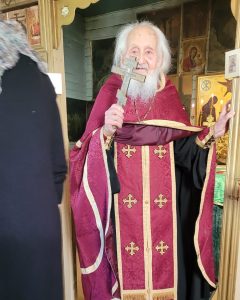
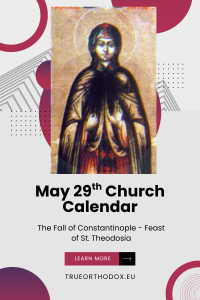
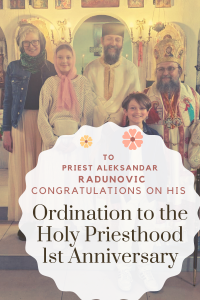

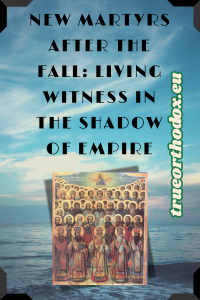
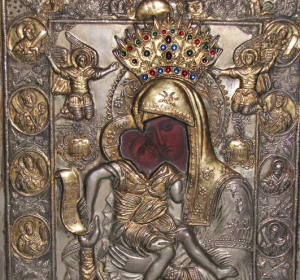
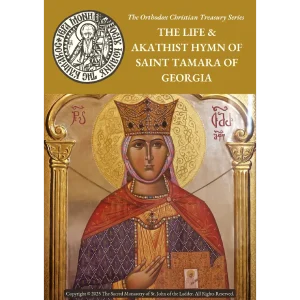
I’m so glad I joined this website 🙏🏻
Thank you for all these comments
We thank you!